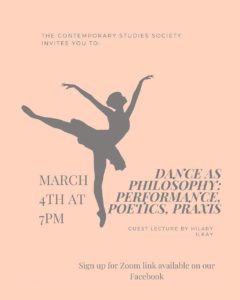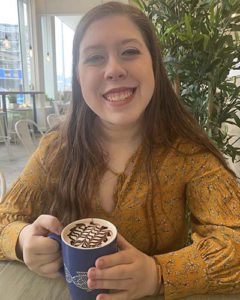The Conference of the Contemporary is entirely student led and offers unique opportunities to King’s students. The amazing executive team of the Contemporary Studies Society (CSS), although only a three-person executive, brought so much passion and drive that we were able to work together to plan all aspects of the conference, from the guest lecture, to accepting papers, to organizing the day and moderating. This planning meant it all flowed comfortably.
 The event offers the unique opportunity to students to present their work at an undergraduate conference and experience conference presentation prior to graduate school. While the conference is by students for students, we wish to thank the Contemporary Studies Program Director, Dr. Dorota Glowacka, for her support and guidance throughout the planning process.
The event offers the unique opportunity to students to present their work at an undergraduate conference and experience conference presentation prior to graduate school. While the conference is by students for students, we wish to thank the Contemporary Studies Program Director, Dr. Dorota Glowacka, for her support and guidance throughout the planning process.
The society’s executive spent a lot of time discussing the way in which we would group these papers. Each paper was so unique and impactful that we knew we had to spend time to make sure that they fit together cohesively and in a way that created a larger narrative. Finally, we decided on our three themes which were: language, ethics and women. From there we were able to create the panels so that they would flow together while each offered their unique perspective.
The three panels encompassed an array of topics. The first panel, entitled “Defense of Language” explored the role of linguistic imagination in philosophy. Kicking off the conference was Sophie Harriman with the paper, “Queerness in the Unsaid: The Secret Power of Female Emotion.” Anya Deady then presented her essay entitled “Passing Time in the Time-Loop: Memory and Conversation in Samuel Beckett’s Waiting for Godot.” Nellianne Bateman completed the presentations with her paper, “Feelings are not a Luxury: Reflections on Poetry Under Capitalism, Colonialism, and Racist and Sexist Hegemony.”
The second panel was entitled “Contemporary Issues: Biopolitics and Ethics” and was built around enduring issues that have impacted our modern conceptions of the world. Focusing on some very serious topics, this panel delved into biopolitical and ethical issues of the past and present. The first paper was by Hope Moon and explored her paper “‘My body, my choice’: The Deconstruction of Levinasian Responsibility in the COVID-19 Pandemic.” Next Sarah Clift read Meredith Bullock’s exhibition piece, “The Fraught Discourse Between Eugenics and Modernity.” Finally, Rob Tremayne presented his paper, “Designed to Fail: the Intentions and Impact of Canadian Residential Schools.”
The final panel of the day was entitled “Representations of Women.” This paper explored some of the ways in which femininity interacts with all aspects of contemporary experience, from art and dress to ideologies and our prison system. Grace Day started us off with an analysis of Degas entitled, “The Misogyny behind Degas’ Ballerinas.” Next, Elsy Rytter presented her work, “Swedish Fold Dress and Romantic Nationalism.” After that paper we turned to a pre-recorded lecture by Katie Cheslock entitled “Neoliberal Feminism as a Development issue.” Unfortunately, there was a technological issue so we could not all watch the presentation together, but the link was distributed so that it could be watched at a later date. Finally, Charlotte Friesen finished off our conference with the paper “Indigenous Women and the State.” These three panels sparked thoughtful and interesting questions about the connections among the presentations and around the specifics of each paper.
We were also lucky to have an incredible guest lecture from King’s own Foundation Year Program Faculty Fellow Hilary Ilkay, entitled, “Dance as Philosophy: Performance, Poetics, Praxis.” Professor Ilkay led us through a beautiful meditation on dance’s role in philosophy. Her lecture was divided into three ‘movements’ and discussed the way in which dance structures different part of academic experiences. The lecture sparked questions about Walter Benjamin and his conception of aura, as well as a discussion about whether or not dancers write in a uniquely differently way than do non-dancers.
As a student organizer of this conference, I am deeply grateful that I got to work with some amazing people and get the experience of conference planning so early in my academic career. Further, I would like to thank the Executive of the CSP Society, Bronwyn Turnquist and Noah Poitras, for working so incredibly hard to make this conference possible. I would also like to thank all of our presenters for thought-provoking works and for agreeing to share them with us. I am also so thankful to Rhema Ferguson who attended the whole conference in the capacity of an active listener in case any students needed supports during the presentations. Finally, I would like to thank everyone who attended the conference, the gift of your time is greatly appreciated.

Neyve Egger is a fourth-year student pursuing a combined honours in Contemporary Studies and Law, Justice, and Society.

